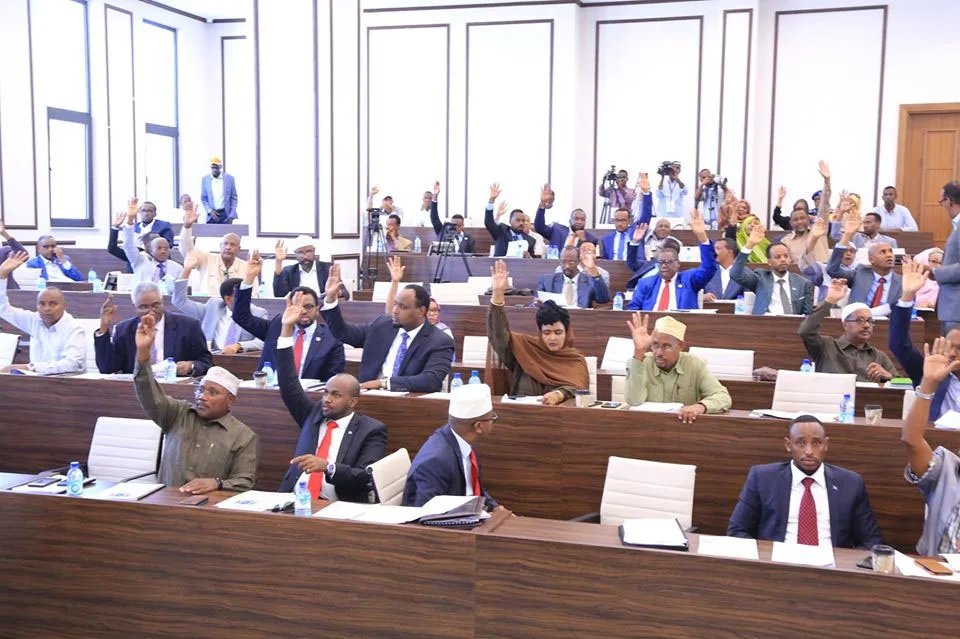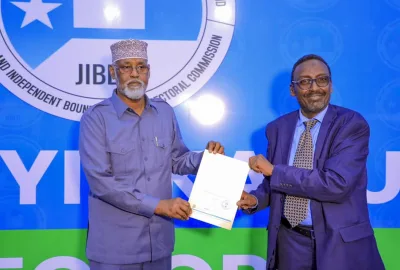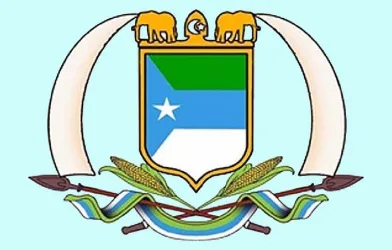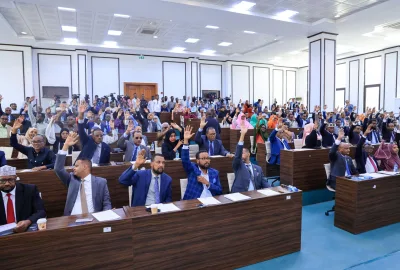The lower house of Somalia’s Parliament on Wednesday approved a new anti-terrorism law that aims to…

The lower house of Somalia’s Parliament on Wednesday approved a new anti-terrorism law that aims to provide a legal framework that will help government security agencies to better fight and eradicate terrorism in Somalia.
Members of Parliament approved the bill 133-3 — with 7 abstentions — on Wednesday after weeks of debate in what Somalia’s intelligence director, Mahad Mohamed Salad, called a crucial law to make the Horn of Africa country a safer place.
“This law is vital for our war against terrorism, and it comes at a time when we most needed it to perform our national responsibility in preventing terror acts and eradicating terrorism,” said Salad.
“Today, a law that would be a shield for women and children from terrorist attacks, and a sharp sword for government security agencies to eradicate the terrorists have successfully passed this house,” said Abdiladif Sanyare, a Somali lawmaker who supported the bill.
Critics of the law say they are concerned about the legislation’s overly broad definition of who is a terrorist, warning that ratification of the law could grant government security agencies excessive and unchecked power.
Hassan Abdi Isma’il is one of the lawmakers who expressed reservations about the legislation during debates.
Even if today’s president and prime minister have good intentions, he said, “we do not know who will come to power in the future, [and] since this is a national law … we do not want it to affect innocent citizens.”
Somali journalist-turned-lawmaker Mohamed Ibrahim Moalimuu, a five-time survivor of al-Shabab terror attacks, said the new bill should not give government agencies easy arrests on suspects without court orders.
“This bill gives the security agencies [approval] to raid and arrest terrorist suspects without court orders and that goes against our constitution,” said Moalimuu. “Therefore, this bill should not conflict with our constitution.”
But Mahdi Mohamed Guled, an MP and Somalia’s former deputy prime minister, says the bill was amended during the debates with a clear definition of terrorism.
“This law aims at the known terrorist organization and groups, and its definition is clear. It would not be used for political purposes,” Guled said.
Second of two important bills
The lower house’s approval of this bill comes amid Somalia’s tough war with al-Shabab, al-Qaida’s most lethal and powerful group in east Africa.
According to Somali law, the bill will go to the upper house of the Parliament for another round of approval. If it passes, it then would go to President Hassan Sheikh Mohamud for final signing into a law.
This is the second important bill that has gone through Somalia’s Parliament in as many months.
Early last month, both the lower and upper chambers of Somalia’s Parliament officially endorsed the bill of the National Intelligence and Security Agency of Somalia, NISA, some 53 years after the nation established its first intelligence agency. The bill is now in the president’s office awaiting his signature.
Human Rights Watch called on President Mohamud to withhold his signature for what they say is a “bill that will expand the powers of the country’s repressive intelligence agency.”
“The draft law, which the Senate passed on February 22, 2023, grants the National Security and Intelligence Agency (NISA) sweeping powers of arrest, detention, and surveillance,” and it has only minimal oversight of the security agencies, said the U.S.-based organization.
VOA’s calls to NISA officials seeking a response to the criticism weren’t answered. The agency, which rarely engages directly with media outlets, often issues statements that categorically deny wrongdoing or violations of human rights, along with statements touting anti-al-Shabab operations across the county.
Militants executed
Meanwhile, 13 al-Shabab militants convicted of murdering officials and carrying out terrorist attacks in the northeastern Somali region of Puntland have been executed by firing squad in three different towns in the region, officials said Wednesday.
Abdifitah Haji Adam, chairperson of the Puntland military court, told the VOA Somali Service that the court found the suspects guilty and handed down the death sentences between 2017 and 2022.
“The men were al-Shabab members,” Adam said. “The men were convicted of carrying out terrorist attacks and assassinations in which they killed government officials, security officers and civilians, including pregnant women and children.”
In addition to the al-Shabab members, the court also executed five Puntland soldiers for killing other soldiers and civilians.
“Seven al-Shabab militants and three Puntland soldiers were executed in Bossaso. In Qardho, 2 soldiers were executed,” said Adam. “In Garowe, one al-Shabab member was executed, in Galkayo, five al-Shabab militants were executed.”
U.S. drone strikes have killed some of al-Shabab’s top leaders, weakening its military power in south and central Somali, causing some of its fighters to spread north to the Puntland mountainous areas to set up bases.
The group still can carry out frequent suicide bombings and assaults on Somalia’s hotels and military targets, proving to be more resilient than expected.
In Puntland, the militant group has assassinated dozens of government officials in recent years, including the attorney general of Puntland Military Courts, AbdiKarim Hasan Fidiye, third deputy commander of Puntalnd Police Forces, and the director of the Presidential Palace.







